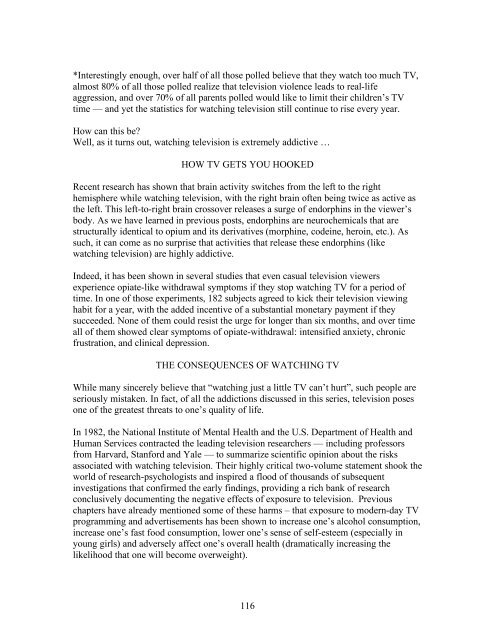Licking the Razor's Edge (2015)
Recognizing the hidden addictions that bind you, … to then set your True Self free
Recognizing the hidden addictions that bind you,
… to then set your True Self free
Create successful ePaper yourself
Turn your PDF publications into a flip-book with our unique Google optimized e-Paper software.
*Interestingly enough, over half of all those polled believe that <strong>the</strong>y watch too much TV,<br />
almost 80% of all those polled realize that television violence leads to real-life<br />
aggression, and over 70% of all parents polled would like to limit <strong>the</strong>ir children’s TV<br />
time — and yet <strong>the</strong> statistics for watching television still continue to rise every year.<br />
How can this be?<br />
Well, as it turns out, watching television is extremely addictive …<br />
HOW TV GETS YOU HOOKED<br />
Recent research has shown that brain activity switches from <strong>the</strong> left to <strong>the</strong> right<br />
hemisphere while watching television, with <strong>the</strong> right brain often being twice as active as<br />
<strong>the</strong> left. This left-to-right brain crossover releases a surge of endorphins in <strong>the</strong> viewer’s<br />
body. As we have learned in previous posts, endorphins are neurochemicals that are<br />
structurally identical to opium and its derivatives (morphine, codeine, heroin, etc.). As<br />
such, it can come as no surprise that activities that release <strong>the</strong>se endorphins (like<br />
watching television) are highly addictive.<br />
Indeed, it has been shown in several studies that even casual television viewers<br />
experience opiate-like withdrawal symptoms if <strong>the</strong>y stop watching TV for a period of<br />
time. In one of those experiments, 182 subjects agreed to kick <strong>the</strong>ir television viewing<br />
habit for a year, with <strong>the</strong> added incentive of a substantial monetary payment if <strong>the</strong>y<br />
succeeded. None of <strong>the</strong>m could resist <strong>the</strong> urge for longer than six months, and over time<br />
all of <strong>the</strong>m showed clear symptoms of opiate-withdrawal: intensified anxiety, chronic<br />
frustration, and clinical depression.<br />
THE CONSEQUENCES OF WATCHING TV<br />
While many sincerely believe that “watching just a little TV can’t hurt”, such people are<br />
seriously mistaken. In fact, of all <strong>the</strong> addictions discussed in this series, television poses<br />
one of <strong>the</strong> greatest threats to one’s quality of life.<br />
In 1982, <strong>the</strong> National Institute of Mental Health and <strong>the</strong> U.S. Department of Health and<br />
Human Services contracted <strong>the</strong> leading television researchers — including professors<br />
from Harvard, Stanford and Yale — to summarize scientific opinion about <strong>the</strong> risks<br />
associated with watching television. Their highly critical two-volume statement shook <strong>the</strong><br />
world of research-psychologists and inspired a flood of thousands of subsequent<br />
investigations that confirmed <strong>the</strong> early findings, providing a rich bank of research<br />
conclusively documenting <strong>the</strong> negative effects of exposure to television. Previous<br />
chapters have already mentioned some of <strong>the</strong>se harms – that exposure to modern-day TV<br />
programming and advertisements has been shown to increase one’s alcohol consumption,<br />
increase one’s fast food consumption, lower one’s sense of self-esteem (especially in<br />
young girls) and adversely affect one’s overall health (dramatically increasing <strong>the</strong><br />
likelihood that one will become overweight).<br />
116


















